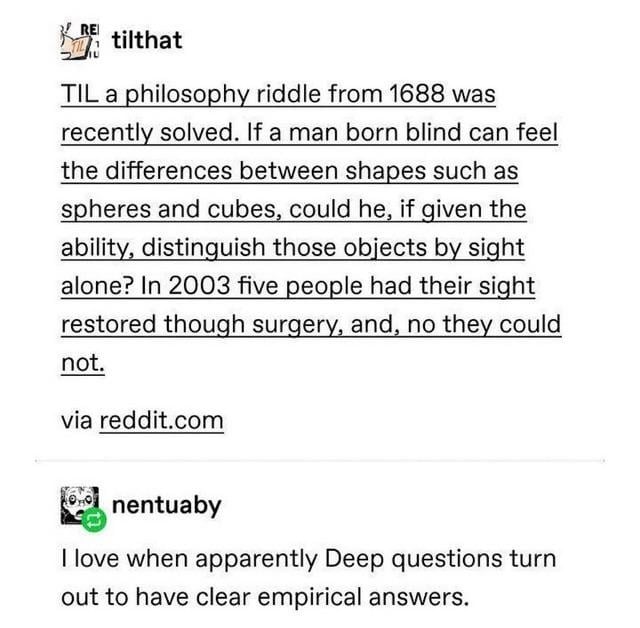this post was submitted on 21 Oct 2023
1043 points (98.5% liked)
Microblog Memes
4775 readers
2184 users here now
A place to share screenshots of Microblog posts, whether from Mastodon, tumblr, ~~Twitter~~ X, KBin, Threads or elsewhere.
Created as an evolution of White People Twitter and other tweet-capture subreddits.
Rules:
- Please put at least one word relevant to the post in the post title.
- Be nice.
- No advertising, brand promotion or guerilla marketing.
Related communities:
- !whitepeopletwitter@sh.itjust.works
- !best_of_mastodon@sh.itjust.works
- !curatedtwitter@sh.itjust.works
- !curatedtumblr@sh.itjust.works
founded 1 year ago
MODERATORS
you are viewing a single comment's thread
view the rest of the comments
view the rest of the comments

Sight is a combination of raw data input and interpretation of that data. It turns out that if you miss a critical window of learning early in life, you are almost certain to never learn how to interperet that data correctly even if you gain the ability to see. Many people who have gained sight after being blind from birth find it simply overwhelming and regret the medical intervention. Richard L. Gregory's "Eye and Brain: The Psychology of Seeing" is a fascinating read on this topic. Even those with sight fail to interpretet things properly depending on their experience - for example, someone who lived in a dense forest all their life (where they never had the opportunity to see anything from a distance), is likely to think that the elephants are the size of ants if they are viewed from afar. A lot of brainpower goes into learning how to see in early life, and if you miss that, it's over.
I wonder if this would extend to any attempt to augment human sight. Like, if we could implant new cells in someone's eyes, identical in function to the ones that let them see colors, but these new cells detect, say, ultraviolet, would their brain be able to figure out what to do with the data?
Tweaking existing senses does work, but there's limits. There's people experimenting with stuff like implanting magnets in their fingers
Interesting question!